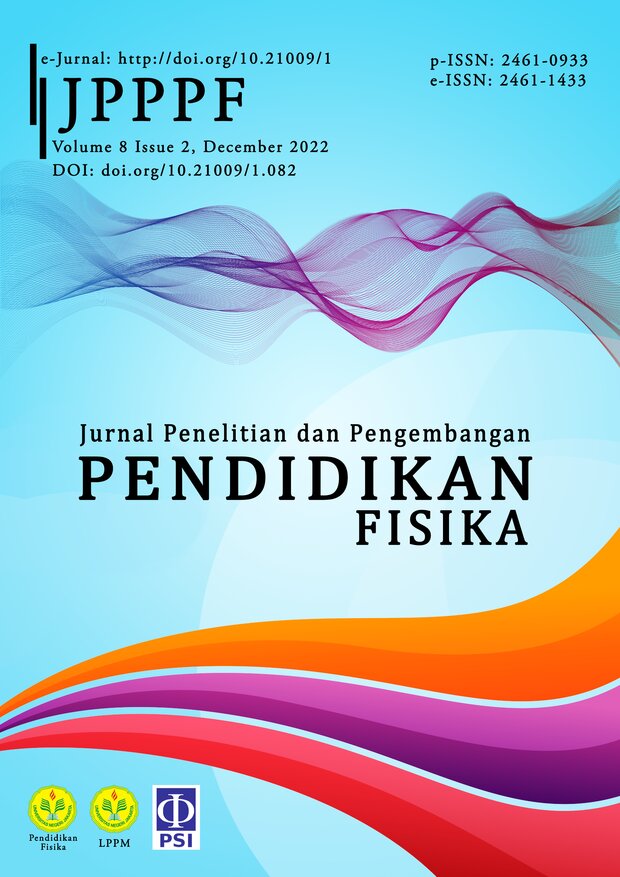“Elektrotektif”: An Educational Game to Explore Electricity Concept Using Case-Based Learning
DOI:
https://doi.org/10.21009/1.08210Keywords:
case-based learning, interactive media, educational gamesAbstract
Learning physics is relevant to many cases in everyday life. Various media have been developed for physics learning, e.g., educational games. Educational games can be used as a way to motivate students who are mostly digital natives who were born and grew up in an all-digital environment. This research aims to produce a case-based educational game on electricity called Elektrotektif. This study used the research and development method with the ADDIE model. The result is an investigative game in which there are cases related to electricity in daily life, such as short circuits, electrocution, and electrostatic discharge. The quantitative evaluation results in a value of 86.5% for aspects validation of learning media, and the results from the user were 86%, with the interpretation “very good” to be used as learning companion media. Learning by using cases in a game can help students connect to real-world situations and provide solutions to physical events that excitingly occur around them.
References
Arikunto, S 2017, ‘Pengembangan Instrumen Penelitian dan Penilaian Program’, Pustaka Belajar, Yogyakarta.
Azeem, M, Ahmad, M & Hussain, M 2018, ‘Effectiveness of Case Based Learning in Orthodontics for BDS’, Pakiatan Journal of Medical and Health Science, pp. 762-763.
Byun, J & Joung, E 2017, ‘Digital game-based learning for K–12 mathematics education: A Meta-Analysis’, School Science and Mathematics, vol. 118, pp. 113-126.
Daryanto 2016, ‘Media Pembelajaran’, Gava Media, Yogyakarta.
Demircioğlu, S & Selçuk, GS 2016, ‘The effect of the case-based learning method on high school physics students’ conceptual understanding of the unit on energy’, Asia-Pacific Forum on Science Learning & Teaching, vol. 17, no. 2.
Fadda, D et al. 2022, ‘Effects of digital games on student motivation in mathematics: A meta-analysis in K-12’, Journal of Computer Assisted Learning, vol. 38, no. 1, pp. 304-325.
Faiella, F & Ricciardi, M 2017, ‘Gamification and Learning: A Review of Issues and Research’, Journal of e-Learning and Knowledge Society, vol. 13, no. 2, pp. 13-21.
Gagne, RM et al. 2005, ‘Principles of Instructional Design Fifth ed’, Thomson Learning, Florida.
Hung, HT et al. 2018, ‘A Scoping Review of Research on Digital Game-Based Language Learning’, Computer & Education, vol. 126, pp. 89-104.
InMobi 2021, ‘Mobile Gaming Through the Pandemic and Beyond in Southeast Asia’, Inmobi, Singapore.
Ismail, A et al. 2019, ‘Enhancing students’ conceptual understanding of electricity using learning media-based augemented reality’, IOP Conf. Series: Journal of Physics: Conf. Series, vol. 1157, no. 3, p. 032049.
Kalogiannakis, M & Papadaki, S 2019, ‘Evaluating pre-service kindergarten teachers’ intention to adopt and use tablets into teaching practice for natural sciences’, International Journal of Mobile Learning and Organisation, vol. 13, no. 1, pp. 113-127.
Kartika, Y et al. 2019, ‘Improving Math Creative Thinking Ability by using Math Adventure Educational Game as an Interactive Media’, Journal of Physics: Conference Series.
Lubis, F 2019, ‘Education in the disruption era’, Britain International of Linguistics Arts and Education (BIoLAE) Journal, vol. 1, no. 2, pp. 183-188.
Mensan, NÖ & Anagün, SS 2022, ‘Primary School Teachers’ Perceptions of Digital Culture’, International Journal of Progressive Education, vol. 18, no. 1, pp. 397-410.
Mulyati, D et al. 2022, ‘Fire Phyghter - The Development of Educational Games for Exploring Dynamic Fluids Topic’, Journal of Physics: Conference Series, vol. 2377.
Nasrudin, N et al. 2018 ‘Multimedia educational game approach for psychological condition’, International Journal of Engineering and Technology, vol. 7, no. 29, pp. 78-81.
Naveed, T 2017, ‘Perception of Medical Students Regarding Case Based Learning’, Journal of Rawalpindi Medical College, pp. 303-305.
Pribadi, BA, 2017, ‘Media dan Teknologi dalam Pembelajaran’, Kencana, Jakarta.
Ramdani, SD et al. 2021, ‘Developing digital teaching material on basic electricity based on problem-based learning in vocational education’, Jurnal Pendidikan Vokasi, vol. 11, no. 1, pp. 78-91.
Rong, H & Choi, I 2019, ‘Integrating failure in case-based learning: a conceptual framework for failure classification and its instructional implications’, Educational Technology Research and Development, vol. 67, no. 3, pp. 617-637.
Sarjono 2017, ‘Internalisasi Berpikir Kritis dalam Pembelajaran Fisika’, Journal of Madaniyah-2017, pp. 343-353.
Siregar, E & Hartini, N 2019, ‘Teori Belajar dan Pembelajaran’, Ghalia Indonesia, Bogor.
Surjono 2017, ‘Multimedia Pembelajaran Interaktif Konsep dan Pengembangan’, Universitas Negeri Yogyakarta (UNY), Yogyakarta.
Syah, DH et al. 2020, ‘The Development of Taxation Learning Media Based on Articulate Storyline’, International Conference on Strategic Issues of Economics, Business and, Education (ICoSIEBE), pp. 269-273.
Tiwale , M et al. 2019, ‘Effectiveness of Case Based Learning in First MBBS Students in Physiology: An Educational Strategy to Promote Clinical Diagnostic Reasoning’, International Journal of Health Science and Research, vol. 9, no. 9, pp. 1-8.
Viviers, HA 2016, ‘Developing soft skills (also known as pervasive skills): Usefulness of an educational game’, Meditari Accountancy Research, vol. 24, no. 3, pp. 368-389.











